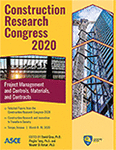Construction Research Congress 2020
A Serious Gaming Approach to Integrate BIM, IoT, and Lean Construction in Construction Education
Publication: Construction Research Congress 2020: Project Management and Controls, Materials, and Contracts
ABSTRACT
Whereas building information modeling (BIM) and lean construction (LC) can be considered state-of-the-art practices in construction project design, planning, and control, internet of things (IoT) has yet a chance to connect processes in construction site monitoring applications and beyond. An opportunity might be that all of the aforementioned methods are hardly well enough integrated in a systematic way for purposes in knowledge-based decision making. A prominent example is that LC and associated simulation games in academic or professional education still rely much on manual data input and analysis. Proposed is a learning platform (a serious gaming environment) that teaches the concept of permanent availability of up-to-date actual performance data sets using an integrated BIM-IoT-LC approach. While the platform builds upon existing cloud-based BIM tools and well-known takt planning and takt control principles, a novel IoT platform was developed that rapidly elevates the gathering and transformation from data to information to knowledge while the participants play the game. The platform was tested in several academic learning environments around the world. Findings demonstrate the participants understand the important role of technology in practical applications. By extending their experiences from traditional LC simulation games with the BIM and IoT components, specifically, they were able to interact and collaborate more closely. Access to just-in-real-time project status information on smart wearable devices and large display screens helped improving the expected project execution timeline while reducing certain waste factors. One limitation that was discovered is the tight integration of the developed technology into new learning curricula that aim at digitalizing construction.
Get full access to this article
View all available purchase options and get full access to this chapter.
REFERENCES
Taneja, S., Akcamete, A., Akinci, B., Garrett, J.H., Soibelman, L., William, E. (2012). “Analysis of Three Indoor Localization Technologies for Supporting Operations and Maintenance Field Tasks”, J. Comp. Civ. Eng. 708-719.
Cheng, T., Yang, J., Teizer, J, and Vela, P.A. (2010). “Automated Construction Resource Location Tracking to Support the Analysis of Lean Principles”, Proc. 18th Ann. Conf. of IGLC, Haifa, Israel, 643-653.
Costin, A. M., Teizer, J., and Schoner, B. (2015). “RFID and BIM-enabled worker location tracking to support real-time building protocol and data visualization.” J. Inf. Technol. Constr., 20, 495–517.
Dave, B., Boddy, S. and Koskela, L. (2011). “Visilean: Designing a production management system with Lean and BIM”, 19th IGLC, Lima.
Demir, S.-T, and Theis, P. (2018). “Die Interaktion von Building Information Modeling und Lean Construction Management”, Bauingenieur, 130-135.
Fosse, R., Ballard, G. and Fischer, M. (2017). “Virtual Design and Construction: Aligning BIM and Lean in Practice”, LC3, Heraklion, 1, 499-506.
Hamzeh, F.R, and Albanna, R.M, (2019). “Developing a Tool to Assess and Enhance the Workers’ Understanding of Lean Concepts of Construction.” Proc. 27th IGLC, Dublin, Ireland, 179-190, https://doi.org/10.24928/2019/0241.
Li, X., Shen, G.Q., Wu, P., Fan, H.Q., Wu, H.Q., Teng, Y. (2018). “RBL-PHP: simulation of lean construction and information technologies for prefabrication housing production”, J. Mgmt. in Eng., 34(2), 4017053.
Koskela, L. (1992). “Application of the new Production Philosophy to Construction”, CIFE Technical Report #72, CIFE, Stanford University.
Koskela, L. J. (2000). “An Exploration Towards a Production Theory and its Application to Construction”, VTT Technical Research Centre of Finland.
Mollasalehi, S., Aboumoemen, A.A., Rathnayake, A., Fleming, A., and Underwood, J. (2018). “Development of an Integrated BIM and Lean Maturity Model”, 26th IGLC, Chennai, 1217–1228.
Neges, M., Wolf, M., Propach, M., Teizer, J., Abramovici, M. (2017). “Improving Indoor Location Tracking Quality for Construction and Facility Management”, 34th ISARC, Taipei, Taiwan, https://doi.org/10.22260/ISARC2017/0012.
Singhal, N., Ahuja, and Ritu. (2018). “BIM furnish Lean benefits - an Indian case study. 26th IGLC, Chennai, 90-100.
Tillmann, P., and Sargent, Z. (2016). “Last Planner & BIM Integration: Lessons from a Continuous Improvement Effort”, 24th IGLC, Boston, 113-122.
Toledo, M., González, V.A., Villegas, A. and Mourgues, C. (2014). “Using 4D Models for Tracking Project Progress and Visualizing the Owner’s Constraints in Fast-Track Retail Renovation Projects”, 22nd IGLC, Oslo, 969-980.
Sacks, R., Esquenazi, A., and Goldin, M. (2007). “LEAPCON: Simulation of lean construction of high-rise apartment buildings.” J. Constr. Eng. Mgmt., 133:7(529), 529–539.
Sacks, R., Dave, B., Koskela, L., & Owen, R. (2009). “Analysis Framework for the Interaction Between Lean Construction and Building Information Modelling”, 17th IGLC, Taipei, 1-10.
Sacks, R., Radosavljevic, M., and Barak, R. (2010). “Requirements for building information modeling based lean production management systems for construction”, Automation in Construction, 19(6), 641-655.
Teizer, J., Melzner, J., Wolf, M., Golovina, O., König, M. (2017). “Automatisierte 4D-Bauablaufvisualisierung und Ist-Datenerfassung zur Planung und Steuerung von Bauprozessen”, Bauingenieur, Springer, 129-135.
Teizer, J., Wolf, M., Golovina, O., Perschewski, M., Neges, M., König, M. (2017). “Internet of Things (IoT) for Integrating Environmental and Localization Data in Building Information Modeling (BIM)”, 34th ISARC, Taipei, Taiwan.
Teizer, J., Lao, D., & Sofer, M. (2007). “Rapid Automated Monitoring of Construction Site Activities using Ultra-Wideband”, 24th ISARC, Cochin, India, 23-28.
von Heyl, J. and Demir, S.-T. (2019). “Digitalizaing lean construction with building information modeling”, 27th IGLC, Dublin, 843-852.
von Heyl, J. and Teizer, J. (2017). “Lean Production Controlling and Progress Tracking using Digital Methods”, LC3, Heraklion, Greece, 127-134.
Information & Authors
Information
Published In
Construction Research Congress 2020: Project Management and Controls, Materials, and Contracts
Pages: 21 - 30
Editors: David Grau, Ph.D., Arizona State University, Pingbo Tang, Ph.D., Arizona State University, and Mounir El Asmar, Ph.D., Arizona State University
ISBN (Online): 978-0-7844-8288-9
Copyright
© 2020 American Society of Civil Engineers.
History
Published online: Nov 9, 2020
Published in print: Nov 9, 2020
Authors
Metrics & Citations
Metrics
Citations
Download citation
If you have the appropriate software installed, you can download article citation data to the citation manager of your choice. Simply select your manager software from the list below and click Download.
